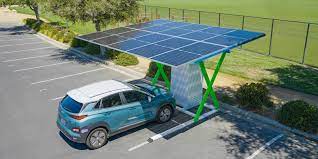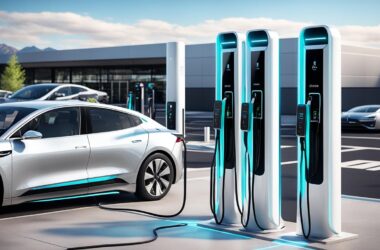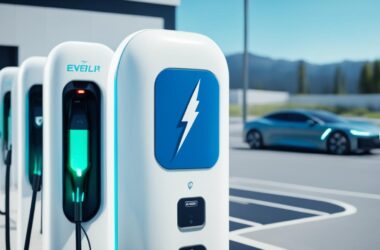Introduction
In today’s rapidly evolving world, the quest for sustainable energy solutions has never been more critical. As concerns about climate change and environmental degradation continue to mount, individuals and nations alike are seeking alternatives to traditional fossil fuels. One such solution gaining traction is the use of solar power to charge electric vehicles (EVs). In this comprehensive guide, we will explore the feasibility, benefits, challenges, and future prospects of charging your EV with solar energy.
Can You Charge an Electric Car with Solar Power?
The short and simple answer is: Yes, you can absolutely charge an electric car battery with solar power. For those who already have solar panels installed, this presents an enticing opportunity to harness the sun’s abundant energy for transportation needs. Much like charging other devices and running household appliances, plugging in your EV is akin to utilizing renewable energy sources.
Feasibility of Solar Charging
While it’s true that a standard home solar installation may not generate enough power in a single day to fully recharge an EV battery from 0% to 100%, this limitation doesn’t have to be a dealbreaker. Considering the average daily driving distances for most individuals, solar charging can still meet a significant portion of an EV’s energy needs.
Solar Charging: A Bright Future
The global shift towards electric mobility is accelerating, driven by concerns over environmental sustainability and energy security. Electric vehicle sales have surged in recent years, signaling a transition away from fossil fuel-dependent transportation systems. As governments and industries prioritize decarbonization efforts, solar charging emerges as a promising solution to power the growing fleet of EVs.
The Current State of Global Solar Generation
Solar power offers an attractive alternative to traditional energy sources due to its widespread availability and environmental benefits. In recent years, global solar capacity has surpassed wind power and is projected to become the world’s largest generator of electricity by 2027. With advancements in technology and falling costs, solar energy is increasingly accessible to households worldwide.
Solar Charging: Maximizing Benefits
While solar panels alone can significantly reduce energy costs for homeowners, coupling them with an electric vehicle presents additional advantages. By generating renewable electricity onsite, solar charging eliminates the need to purchase energy from the grid, reducing both expenses and carbon emissions. Moreover, smart charging features and energy management systems optimize the use of self-generated solar power for EV charging, further enhancing efficiency.
Challenges of Solar Charging
Despite its numerous benefits, solar charging also faces challenges, primarily due to the variable nature of solar power. Factors such as weather conditions and sunlight exposure can affect the reliability and consistency of solar energy generation. Additionally, standard home solar installations may not produce enough power to fully recharge an EV battery in a single day, necessitating alternative charging solutions.
Optimizing Solar Charging
To address the variability of solar power, various optimization strategies can be employed. Energy management systems and smart charging features enable homeowners to prioritize the use of self-generated solar energy for EV charging. By coordinating energy usage and storage, these systems ensure efficient and sustainable charging practices.
The Role of Battery Storage
One key challenge of solar charging is aligning energy generation with consumption, particularly for EVs charged overnight or during periods of low sunlight. Battery storage systems offer a solution by storing excess solar energy for later use. By integrating battery storage with solar panels and EV chargers, homeowners can maximize self-consumption of renewable energy and reduce reliance on the grid.
Exploring Government Incentives
Governments around the world are incentivizing renewable energy adoption, including solar power and EV charging. Subsidies, tax credits, and net metering schemes encourage homeowners to invest in solar panels and battery storage systems, offsetting upfront costs and promoting sustainability. Additionally, non-governmental organizations may offer grants and incentives to support residential solar EV charging initiatives.
Pros and Cons of Solar Charging
As with any energy solution, solar charging has its pros and cons that must be carefully considered. While solar-generated electricity is free and renewable, initial investment costs for solar panels and battery storage can be significant. Moreover, the variability of solar power and the need for additional infrastructure, such as inverters and smart charging systems, pose challenges to widespread adoption.
Future Prospects: Innovations in Solar Charging
Despite existing challenges, ongoing advancements in technology hold promise for the future of solar charging. Bidirectional charging, which enables EVs to both draw power from and supply power to the grid, represents a groundbreaking innovation with the potential to revolutionize energy distribution and storage. As this technology matures, it could facilitate greater integration of renewable energy sources and enhance grid resilience.
Conclusion: Driving Towards a Sustainable Future
In conclusion, charging your electric vehicle with solar power offers a compelling pathway towards sustainability and energy independence. While challenges exist, the benefits of solar charging, including cost savings, environmental impact reduction, and grid resilience, outweigh the drawbacks. By leveraging government incentives, innovative technologies, and consumer awareness, we can accelerate the transition to a cleaner, greener future powered by solar energy and electric vehicles.










